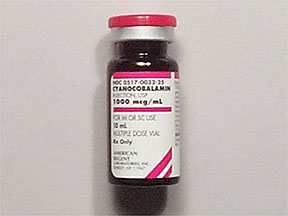
Cyanocobalamin Coupons & Savings Card – Discount Prices from $4.97
Generic for: Hm vitamin b-12, Sm vitamin b-12, Cvs vitamin b-12
My prescription
Edit
1ML of 1000MCG/ML, Cyanocobalamin (1 Vial)
Select pharmacy

CVS
$19.39
COUPON PRICE
Walmart
$4.97
COUPON PRICE
Walgreens
$6.80
COUPON PRICE
Albertsons
$7.60
COUPON PRICECyanocobalamin savings card
Show this card to your pharmacist
Walmart
$4.97
BIN
ID
PCN
GRP
019876
LH5E6D5078
CHIPPO
LHX
Powered by
More prescriptions for vitamin b12 deficiency
More prescriptions for vitamin b12 deficiency
Price history for Physicians Ez Use B-12 (brand) & Cyanocobalamin (generic)
1 Vial, 1ML of 1000MCG/ML
Average retail price for Physicians Ez Use B-12
Average retail price for Cyanocobalamin
Average SaveHealth price for Cyanocobalamin
Our price history data is based on aggregated prescription data collected from participating pharmacies in America. Our prescription data updates daily to reflect the latest price changes. If you notice a missing data point, it means there wasn't sufficient data available to generate a monetary value for that date.
We analyzed Cyanocobalamin prices for (1ML of 1000MCG/ML, 1 Vial) over the last 12 months. The average retail price was $28.26, while the average price using the SaveHealth discount card was $13.16. That's a savings of approximately 53.43% when using our Cyanocobalamin coupon.
Compared to the generic version, Physicians Ez Use B-12 had an average price of $334.31 over the same time period. With the SaveHealth savings card, Cyanocobalamin is 96.06% cheaper on average than Physicians Ez Use B-12.
*Retail prices are based on pharmacy claims data, and may not be accurate when we don't have enough claims.
Cyanocobalamin dosage forms
Dosage Quantity Price from Per unit 1ML of 1000MCG/ML 1 Vial $4.97 $4.97 1ML of 1000MCG/ML 2 Vials $7.44 $3.72 1ML of 1000MCG/ML 3 Vials $16.41 $5.47 30ML of 2000MCG/ML 1 Vial $10.20 $10.20 30ML of 2000MCG/ML 2 Vials $39.40 $19.70 30ML of 2000MCG/ML 3 Vials $68.59 $22.86
| Dosage | Quantity | Price from | Per unit |
|---|---|---|---|
| 1ML of 1000MCG/ML | 1 Vial | $4.97 | $4.97 |
| 1ML of 1000MCG/ML | 2 Vials | $7.44 | $3.72 |
| 1ML of 1000MCG/ML | 3 Vials | $16.41 | $5.47 |
| 30ML of 2000MCG/ML | 1 Vial | $10.20 | $10.20 |
| 30ML of 2000MCG/ML | 2 Vials | $39.40 | $19.70 |
| 30ML of 2000MCG/ML | 3 Vials | $68.59 | $22.86 |
